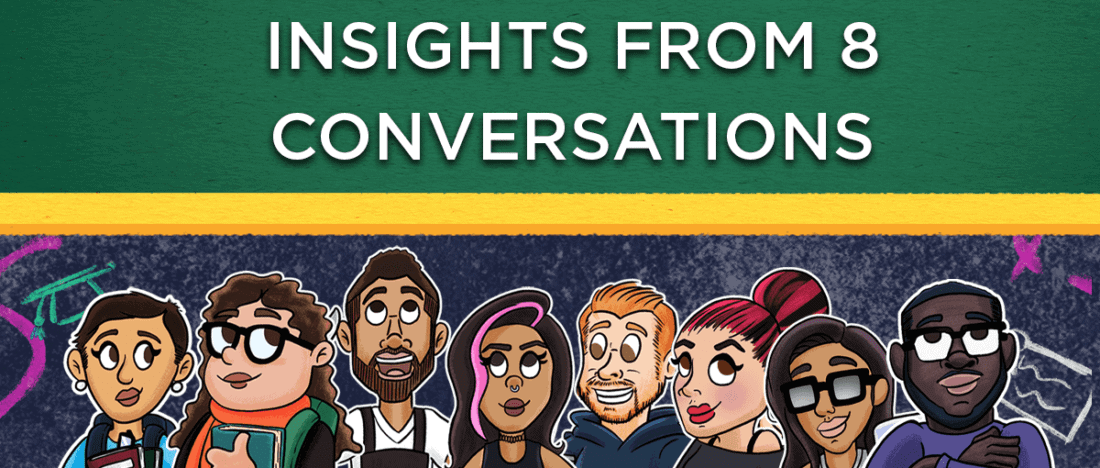Are you in high school wondering what your next move should be after graduation? Maybe you’re currently applying for university or trying to snag your dream internship? Perhaps you’ve been out of school for a little while but now you’re trying to decide whether to go back? If any of that sounds like you, keep reading.
Today we’re talking to Megan, a long island native who’s currently attending Columbia after getting in on her first try, soon after she graduated from high school. Keep reading to get Gary’s take on her journey and his advice for anyone in a similar position.
Traditional College
Megan is another proud member of Gen Z. She’s a junior at Columbia University, also experiencing the effects Covid has on her education.

Relationship to formal education.
Education has always been a strong part of my life. I’ve always been a good student. It was one of my defining traits. Also, it was very common where I grew up.
Do you think your degree, and the education you’re getting, will help you more effectively serve people? Or will it just help you get better opportunities?
I think the type of people I’m meeting here are informing my political thinking. There are lots of wealthy people but Columbia also has a generous aid package, so there’s a good mix of ideas.
I’ve never learned anywhere else so I don’t know if the education from Columbia is better equipping me to be an advocate for certain people, but I do know it’s changing my thinking and challenging me. I have a deep understanding of the first amendment and state politics–I’ve had great professors and I’m learning so much.
But I know prestige begets prestige which will help me in the future.
What are some of your goals?
I became interested in law after taking some electives in high school. Later, I got into local politics after doing a few political campaigns, both in DC and here in New York City. I want to go to law school, that’s my formal education, end goal. I’d like to be an attorney, judge, or run for local office.
Will college help with your goals?
I was really conscious of this when I was applying. I want to go to a law school that’s prestigious and rigorous, so I need to attend a similar undergraduate university. The top law schools definitely consider your undergraduate degree. I want to get a foot in the door with more competitive graduate schools. For some people, price is more important than prestige. My twin brother, for example, he wants to be a nurse so he’s more interested in what’s the most cost effective.
What is your tuition paying for?
Networking, education, and the professors. I’ve studied under amazing professors; Columbia opens doors. When I have Columbia on my resume it gets me the interview. There are Columbia graduates who only hire Columbia graduates.
How are you paying for tuition?
Lots of financial aid, and I’m an RA. I might not be an RA if that didn’t make it virtually free for me to come here. My first semester I did take out some student loans and my mom had saved money as well.
People assume schools like Columbia or Havard are unaffordable, but they have massive , billion dollar endowments. They just throw money at students that need it. Everyone should apply and take advantage of the financial aid packages.
Of course, it’s not as accessible if you’re an international student. It’s definitely difficult to get in but once you do, the administration works with your financial needs.
Has Covid Changed Your Opinion Of School?
Covid has taken away the social aspect of school. But I’m able to do the same readings, discussions, and work virtually. It’s easier in person but Covid hasn’t changed my opinions.
Do you think you can learn the same things you’re learning at Columbia just by joining the workforce?
“There’s theory behind something, then there’s practice and putting them together creates praxis.” School helps me ask, “why do we do things this way? Can we do things differently?” School gives you the basic knowledge of how systems work and also the tools to think critically about it. School doesn’t necessarily prepare you for the workforce, it gives you the scaffolding to or foundation to change the workforce or see if the processes are working the way they’re intended. It expands you, not prepares you.
Study what makes you passionate, not what’s practical. You’ll be much happier.
Did your community push you to go to school?
Yes. We had guidance counselors, mandatory meetings, even if you weren’t applying to college you had to meet with a guidance counselor to explain why that was the case. Vocational school was fine but you had to be doing something. Everyone was expected to complete another level of school. No one mentioned gap years.
Why?
I think it’s a hand me down fear. I’ve never met someone who is young that didn’t want to go back to school after taking a gap year. Even my parents don’t want me to take a gap between undergrad and law school. I feel like people go back if they want to go back.
Gary’s Take
Hiring empathic professionals is easy. A university’s leadership just has to look for them. It has to be part of the process. We spend a lot of time at Vaynermedia looking for “nice people” because that’s important. I think we also need to be empathic to universities–they are businesses, period, end of story.
They’re going to lose their professors to other colleges if they can’t pay them. These colleges, universities, private schools, have shown their cards during this pandemic. They are 100% financially dictated; they’re full of shit of trying to pretend they’re not. I don’t like that part…by the way, on the record, I understand.
A lot of times we look at businesses as “evil”. I don’t look at it that way, I look at it as they’re doing what they need to be doing. Then you, as the individual, need to do what you need to do.
So much of college is ROI: the campus, the people you meet, the experiences–and when they want the same amount of money for you to sit a home on Zoom, you can say go fuck yourself and I’m out.
I’m not surprised that kids are concerned with the administration now because young millennials and Gen Z are some of the most aware, conscious subset of people. However, that bleeds into delusions and ideology . Like, you might not pick a university because you don’t like how they handle things, but remember, they’re doing this to stay alive financially.
People complain about other people making business decisions, and I’m like Why are many people getting a diploma? To leverage it for yourself. Don’t be a hypocrite. It comes down to an honest conversation.
The colleges are doing what’s right for themselves, let’s not act like they’re not.
Resources
How To Get Into An Ivy League School











